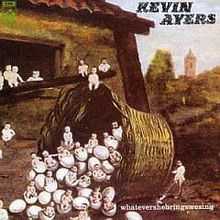Whatevershebringswesing
| Whatevershebringswesing | ||||
|---|---|---|---|---|
 | ||||
| Studio album by Kevin Ayers | ||||
| Released | November 1971 | |||
| Recorded | Mar-Aug 1971; Abbey Road Studios, London | |||
| Genre | Rock | |||
| Length | 36.09 | |||
| Label | Harvest | |||
| Producer | Kevin Ayers & Andrew King | |||
| Kevin Ayers chronology | ||||
| ||||
| Professional ratings | |
|---|---|
| Review scores | |
| Source | Rating |
| Allmusic | |
| Piero Scaruffi | (6.5/10)[2] |
Whatevershebringswesing is the third solo album by Kevin Ayers.
In 1971, Kevin Ayers started recording what would become his most acclaimed album, Whatevershebringswesing accompanied by members of Gong and his previous backing band The Whole World. Praised by NME, Record Mirror and Rolling Stone, the album realized all the musical aspirations Ayers had harboured since the inception of Soft Machine.
As with most Ayers albums, a collision of disparate styles confronts the listener but in this instance they work to extremely powerful effect. The title track with Mike Oldfield's guitar accompaniment and Robert Wyatt’s wracked harmonies would become a template for Ayers subsequent 70s output.[3]
The album opens with "There Is Loving/Among Us" accompanied by David Bedford’s dramatic orchestral arrangement. There follow the vignettes "Margaret" and "Oh My" where Ayers juxtaposes terse lyrics against measured backing. "Song From A Bottom of a Well" marries an explosive arrangement, again featuring Oldfield, to Ayers’ cryptic lyric "This is a song from the bottom of a well / There are things down here / I've got to try and tell". The title track is notable for Oldfield's extended bass solo at the beginning, while "Stranger in Blue Suede Shoes", a flirtation with Ayers' love of early rock and roll, would become a staple of his live set for years to come, a song he would re-record twice that decade.
Many critics and fans have cited Whatevershebringswesing as their favourite Ayers album and it remains to this day a best seller in his catalogue.[4] A reissue in 2003 added four additional songs; "Stars" (B-side to "Stranger..."), "Don’t Sing No more Sad Songs", "Fake Mexican Tourist Blues" (1976 B-side to "Stranger...") and "Stranger In Blue Suede Shoes" (Early Mix Previously Unreleased).
Quotes
"At one of the recording sessions at Abbey Road, I turned up a bit early, as usual. When everyone was supposed to arrive, nobody came, so it was just me and the engineer, Peter Mew, sitting there in Studio Number Two, twiddling our thumbs and waiting. I said, 'Well, look, nobody's going to turn up, I'll make a track,' and so he said, 'All right then.' In about an hour and a half I made an entire track: all the overdubbing, the percussion, the guitar and bass - I did three harmonized electric guitars. I was really getting carried away, it was all a bit megalomaniacal. I got the entire staff of the studio in at one point to sing some lyrics I made up. I was having a ball and it sounded bloody good as well.
Eventually, Kevin rolled in. I said, 'I've done it, I've done a track!' He was a bit put out, I think, that I had taken over his studio time, so my track was taken off the machine. [...] He did keep it as a backing track: he put some different words to it and it was put on the album, I think it's called 'Champagne Cowboy Blues.'" (Mike Oldfield, from Changeling: The Autobiography ISBN 978-0-7535-1307-1)
Track listing
Side 1
- "There is Loving (Ayers)/Among Us (Bedford)/There is Loving (Ayers)" (7:22)
- "Margaret" (3:20) (Ayers)
- "Oh My" (2:59) (Ayers)
- "Song from the Bottom of a Well" (4:37) (Ayers)
Side 2
- "Whatevershebringswesing" (8:13) (Ayers)
- "Stranger in Blue Suede Shoes" (3:24) (Ayers)
- "Champagne Cowboy Blues" (3:56) (Ayers)
- "Lullabye" (2:14) (Ayers)
Personnel
- Kevin Ayers / vocals, guitar, bass (6)
- David Bedford / keyboards (1,2,5,6,8,12), orchestral arrangements
- Mike Oldfield / bass (1,3,4), guitar (5,7)
- Dave Dufort / drums (1,4,5)
- William Murray / percussion (2,3,7)
- Tony Carr / drums (6,12)
- Robert Wyatt / Harmony vocals (5)
- Didier Malherbe / saxophone (1), flute (8)
- Gerry Fields / violin (3)
- Johnny Van Derek / violin (2,7)
- Bruce Malamut / flugelhorns (1), incidental brass (1,2,5,6,8,12), ass't engineer (1,2)
Notes
- ↑ Allmusic review
- ↑ Scaruffi, Piero (1999). "Kevin Ayers". pieroscaruffi.com. Retrieved 16 August 2013.
- ↑ Everything You Do Is True, As Long As You Believe It - Whatevershebringswesing sleevenotes by Martin Wakeling (Harvest Sept 2006)
- ↑ Allmusic Guide 2006
References
- Live Review by Richard Williams (Melody Maker, 18 April 1970)
- Album Review (NME, Jan 1972)
- Album Review by Alain Dister (Rock & Folk, Jun 1972)
- Album Review (Sounds, 25 January 1972)
- Album Review (Record Mirror, Jan 1972)
- Album Review (Rolling Stone, Jun 1972)
- Everything You Do Is True, As Long As You Believe It - Whatevershebringswesing sleevenotes by Martin Wakeling (Harvest Sept 2006)